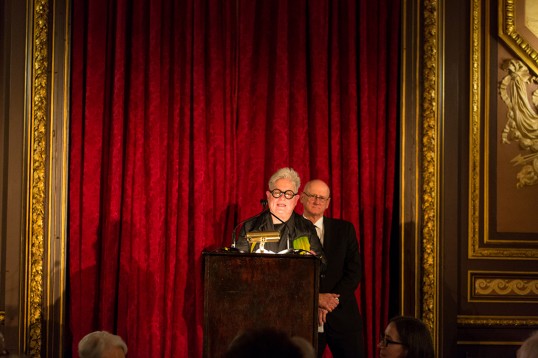President's Medal Remarks
Remarks: Merrill Elam
Remarks delivered at the 2015 President's Medal dinner honoring Henry N. Cobb.
On May 4, 2015, The Architectural League awarded the President’s Medal, its highest honor, to Henry N. Cobb, a founding partner of Pei Cobb Freed & Partners. The remarks that follow were delivered by architect Merrill Elam at the dinner held in Cobb’s honor. Additional remarks were given by Neil Rudenstine, Mack Scogin, and Guy Nordenson.
Dear Harry,
It gives me pause to be here tonight making comments in celebration of your receipt of the President’s Medal.
I will tell you why it gives me pause! Remember in 2009 when you agreed, along with 24 other amazing architects, to sit with me for a video interview for a documentary On Imagination: Conversations with Architects? Well, you agreed to participate but only on the stipulation that I share with you the interview topics in advance. This request did not surprise me entirely; I know how careful you are with words and issues, and the depth of exactitude and intellectual rigor that you bring to all that you touch. (By the way, Harry, you were the only architect of the 25 to make this demand!)
Before we even started the interview you announced that you found my topics thoroughly DREADFUL. I hope you find our topics tonight more to your liking, or at least tolerable.
You know I could have sent this letter to you in advance but I thought better of it. I did not want you to tamper with the topics, which include, among others, generosity, inquisitiveness, eloquence, magic, exactitude, creative imagination, accomplishment, and obsessive dedication.
Now back to the interview. Tellingly, you spent the first 40 minutes of what was scheduled to be an hour-long interview discussing the merits of every other architect except yourself. When you finally did get to yourself, you declared that you could tell me the kind of imagination that you did not have, and that is the imagination of the poet or the artist. That unlike the poet or the artist, your imagination required provocation. It had to be hailed down like a taxi!
Well, I did not stop you and rebut your declaration. It was after all an interview, a moment to listen and record. But tonight is my opportunity for rebuttal.
I would like to argue that the artist and the poet also require provocation, even if it is no more than rain drops on a window sill. What you call provocation I call pure inquisitiveness, an insatiable urge to know more and more, to continually learn and explore. I am convinced that it is this inquisitiveness, this curiosity that drives your architecture, keeping it fresh and forward looking.
Now, concerning generosity. While I understand that you have a long and lovely habit of supporting the broader architect community and architectural institutions, you have been especially generous to Mack and me in so many ways.
The first form of your generosity is that of example. We were learning from you even before we knew there was a Harry. As students we studied a small corporate office building at the intersection of Courtland Street and North Avenue in Atlanta, learning the power of elegant proportions and the value of restraint. As it has turned out, this little building was only the first of a long list of your buildings that we count as gifts to our understanding of architecture.
A second form of your generosity has been direct and personal. When Mack was invited to chair the Department of Architecture at the GSD, you called and invited us to dinner with you and Joan. The chasm between your high visibility New York practice and our small, barely discernible practice in Atlanta could not have been greater, but the hospitality with which you and Joan met us could not have been warmer. You spoke about the school and architecture and a myriad of other topics and Joan shared her tiny, beautifully crafted wood sculptures. Later on, your invitations to share travels in Russia and India proved to be fabulously enriching.
It seems, Harry, that each encounter with you is a moment of reassurance that architecture is essential. That as architects, we are purveyors of the cultural fabric that binds us all together.
You have come quite a long way from the school boy who was counseled that under no circumstance should you become an architect because you had no creative imagination. Thankfully, counseling is a flawed business at best.
Please enjoy this well-deserved evening and this special recognition.
Warm regards,
Merrill Elam

